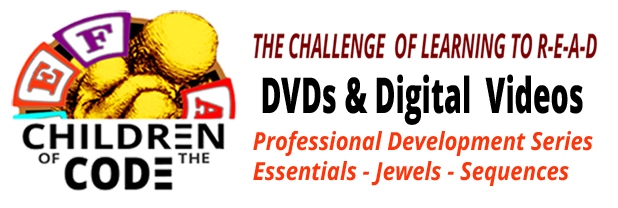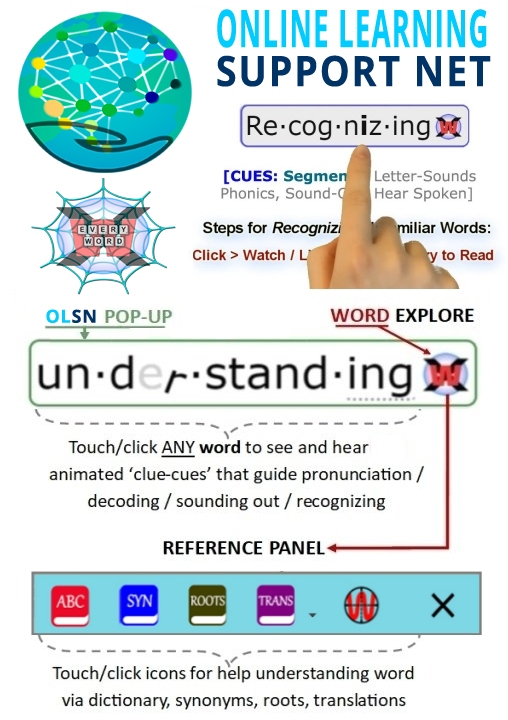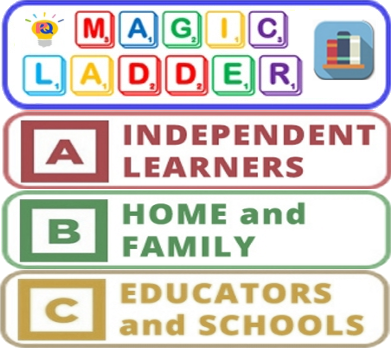Phonics
Note: Remember to click on any word on this page to experience the next evolutionary step in technology supported reading.
It Takes Phonics
Dr. Reid Lyon: What else does it take to learn to read? Well, it does take phonics. I’m sorry, but it takes phonics, which is the F-word in today’s society, at least in the education community. But phonics is nothing more than a relationship between sound structure and a print structure. Phonics.
David Boulton: Phonics developed 400 years ago as an attempt to compensate for the underlying mess in this code.
Dr. Reid Lyon: That’s correct. Yes. Oh yeah. Phonics is absolutely essential, non-negotiable. You can’t read English without it. But it’s not sufficient. But surprisingly, a lot of people say, ‘ Well, I never learned phonics, I learned by this or this or this, nobody ever taught me phonics and I read okay.’ We’ll bring them into our laboratories and we’ll have them read a sentence and put a word in there that they have never seen before and guess what they use? Phonics. They use it because a lot of our kids who can learn to read under any instructional method, no matter how cockamamie, are able to do that because they have already been taught these foundational building blocks.
G. Reid Lyon, Past- Chief of the Child Development and Behavior Branch of the National Institute of Child Health & Human Development, National Institutes of Health, Current senior vice president for research and evaluation with Best Associates. Source: COTC Interview- http://www.childrenofthecode.org/interviews/lyon.htm#phonics
Fear of Phonics
Dr. Timothy Shanahan: I think one of the fears that some people have about formal systems, solid phonics instruction for instance, is the fear that instead of giving kids the sense that there’s a diversity of ways of decoding particular words, different patterns, instead of getting them set for that, instead it gets kids set to the notion that it’s absolutely consistent and easy to negotiate, we teach them that it is straightforward and simple.
David Boulton: Which sets them up for more failure and more shame.
Dr. Timothy Shanahan: Yeah, and I do think at least some of those folks who are opposed to too much phonics instruction are worried that you’ll teach kids a simple code instead of the complex code. And you’re going to give them a mental set for doing this the wrong way, and like you say, it will just set them up for more failure. And I think it’s a legitimate fear given the complexity in the code.
Timothy Shanahan, Past-President (2006) International Reading Association; Member, National Reading Panel; Chair, National Reading Panel; Professor and Director, University of Illinois at Chicago Center for Literacy. Source: COTC Interview – http://www.childrenofthecode.org/interviews/shanahan.htm#VirtualReality
Basic Phonics is Limited
When teachers are lead to understand how we come by the orthographic patterns that we have in modern printed English and look at the layering over the last thousand years or so and then also consider the units of representation in terms of phoneme grapheme correspondence and written syllable patterns and morphemes and morphological units then the whole menu of possibilities of what should be taught to kids over their elementary career becomes clear and people can understand that basic phonics is very limited. Basic phonics does not unlock the code for kids beyond a sort of unsatisfying level beyond just sound-symbol correspondence. It doesn’t teach them anything about the patterns that have something to do with word history and word meaning and the word’s grammatical role.
Louisa Moats is the Director of Professional Development and Research Initiatives at Sopris West Educational Services. Author: Speech to Print: Language Essentials for Teachers, Parenting a Struggling Reader, and LETRS (Language Essentials for Teachers of Reading and Spelling). Source: COTC Interview – http://www.childrenofthecode.org/interviews/moats.htm#HelpingTeachersUnderstandtheCode
Discussing Phonics
David Boulton: And, with respect to the general perception, the way that we think about reading, how much, when you think about our whole language strategies or phonics strategies, how much of the time, effort, cost and all of our thinking about all of this is bent around the code? Is bent around the internal structure of the ambiguities in the code.
Dr. Timothy Shanahan: Well, all the phonics arguments are certainly tied to that. And so much of the argument against teaching phonics is really an argument that the system is too complex to learn through any kind of systematic, explicit teaching, therefore, we should just expose kids to it and they’re brains will figure it out.
David Boulton: Which clearly does not work.
Dr. Timothy Shanahan: Which clearly doesn’t work. But given that you understand how complex the code it, you can at least appreciate why somebody might make such an argument.
David Boulton: Right, but when you look at the arguments for phonics in the way that we’re doing it… I mean, people like Venezky have, run powerful computer models and developed a kind of pattern map to show the structural units of morphemes and phonemes and how they’re distributed across our language system and so we have this very complex way of thinking about all of this on the other side of it.
But when we look at it from the perspective of a child coming up into it, how do we meet them step-by-step-by-step through the confusions in a way that’s keeping it consciously meaningful while their in the exercise of unconsciously automating the code processing required for it?
Dr. Timothy Shanahan: In a way, you partly answered your own question. It’s doing those two things simultaneously. It’s introducing them initially to those simplest aspects of the code and increasingly complex aspects of the code while you keep the emphasis on meaning, while you keep the kids focused on what the benefit of this is.
Those people who allow themselves to say, ‘Well, we have good statistics that says teaching phonics gives kids a benefit, therefore, we should teach phonics.’ They often go so far with it as, therefore, we should only teach phonics. Well, that’s not at all that the research says.
A typical study done on phonics instruction doesn’t look at phonics all by itself versus something else. It looks at phonics embedded in a system of reading instruction that does some of what you’re talking about: it focuses the kids on the meaning, it focuses the kids on the notion that this has some social use in their lives. So that what the youngster is getting is, yes, phonics instruction, but it’s phonics instruction in the context of these other things – writing stories and letters to each other, sharing books with each other, talking about the stories and making sense of them and talking about them. It isn’t that for the next two years we’re going to just work on letters and sounds and everything is wonderful.
David Boulton: Pound out these reflexes as if these reflexes are going to form in the vacuum of any interest in what’s going on.
Dr. Timothy Shanahan: But I’m afraid that what happens with some of the folks that fight so hard for phonics is that they fight so hard for it that they lose sight of some of the other pieces. And of course, then that makes other people fight back even harder and vice versa. In fact, I think the argument itself does damage. As soon as certain people hear that you’re pushing explicit phonics, and I do push explicit phonics as it clearly gives kids a benefit, as soon as you do that, however, there’s immediately a counter-fear by certain educators that that’s all you’re going to do. And so, oh my goodness!
Timothy Shanahan, Past-President (2006) International Reading Association; Member, National Reading Panel; Chair, National Reading Panel; Professor and Director, University of Illinois at Chicago Center for Literacy. Source: COTC Interview – http://www.childrenofthecode.org/interviews/shanahan.htm#ThinkingBentAroundtheCode
Phonics and Whole Language
Dr. Keith Rayner: Right. I think that for a long while too many people were deceived by the whole language approach — which has some positive features to it, such as having kids read and have it be enjoyable and so forth; that’s a good thing to do. There are other aspects of it that are positive as well. But they made a lot of assumptions which I think are not accurate, and I think that phonics really does make explicit to the kid what the relationships are that exist between the graphemes and the phonemes, and that’s why, at the end of the day it’s the best way to teach reading.
David Boulton: It certainly is at the moment. But it’s also a patch code, right?
Dr. Keith Rayner: Yeah. I think lately people have — the pendulum has swung back the other way towards people realizing that phonics is important, and that you can’t just throw that kind of instruction out. There’s clearly other things, as you suggest, that could be done. I think that the level of beginning reading instruction, that’s a good thing that people are more aware of those kind of things now.
Keith Rayner, Distinguished Professor with the Psychology Department, University of Massachusetts; Director of the University’s Eyetracking Laboratory. Source: COTC Interview – http://www.childrenofthecode.org/interviews/rayner.htm#PhonicsandWholeLanguage
Phonics Aversion
…One of the difficulties that some of us have had, and I’ll speak for myself over the past twenty years since I’ve been involved in this, is that many in the research community who have done wonderful work have been somewhat handicapped because they were, in their effort to convince their colleagues that they really had found an answer to how to teach a person to read, they felt like they couldn’t use the term phonics. They couldn’t really talk about decoding, they couldn’t be more specific because it would turn off their colleagues and the teachers. I think they, to some degree, have tried to address this issue without getting to the core of it.
Basically what you’re doing is getting to the core of it. My e-mail is phonicsman and people often think that I’m too radical, too far out because I want to talk about decoding skills. I think that you need to measure whether a person can read in terms of their decoding ability, and that speaks directly to the fact that it’s a code that is learned and once you’ve mastered that then you have at your disposal the ability to unlock any word in the English language. It’s from that point that you learn the vocabulary and have the understanding to comprehend what you’re reading. Maybe your contribution to this will be to in effect, break this, not unwillingness, but reticence, I would say, on the part of some who I have great respect for that believe that in order to persuade their colleagues in the education field that they have to sort of tiptoe around that.
Robert Sweet, Co-Founder, National Right to Read Foundation; Former staff of the U.S. House of Representatives. Source: COTC Interview – http://www.childrenofthecode.org/interviews/sweet.htm#READINGISUNNATURAL













